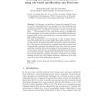Free Online Productivity Tools
i2Speak
i2Symbol
i2OCR
iTex2Img
iWeb2Print
iWeb2Shot
i2Type
iPdf2Split
iPdf2Merge
i2Bopomofo
i2Arabic
i2Style
i2Image
i2PDF
iLatex2Rtf
Sci2ools
136
click to vote
APN
2008
Springer
2008
Springer
Modeling and Analysis of Security Protocols Using Role Based Specifications and Petri Nets
Abstract. In this paper, we introduce a framework composed of a syntax and its compositional Petri net semantics, for the specification and verification of properties (like authentication) of security protocols. The protocol agents (e.g., an initiator, a responder, a server, a trusted third party, . . . ) are formalized as roles, each of them having a predefined behavior depending on their global and also local knowledge (including for instance public, private and shared keys), and may interact in a potentially hostile environment. The main characteristics of our framework, is that it makes explicit, structured and formal, the usually implicit information necessary to analyse the protocol, for instance the public and private context of execution. The roles and the environment are expressed using SPL processes and compositionally translated into high-level Petri nets, while the context specifying the global and local knowledge of the participants in the protocol is used to generate the ...
Related Content
| Added | 12 Oct 2010 |
| Updated | 12 Oct 2010 |
| Type | Conference |
| Year | 2008 |
| Where | APN |
| Authors | Roland Bouroulet, Raymond R. Devillers, Hanna Klaudel, Elisabeth Pelz, Franck Pommereau |
Comments (0)

